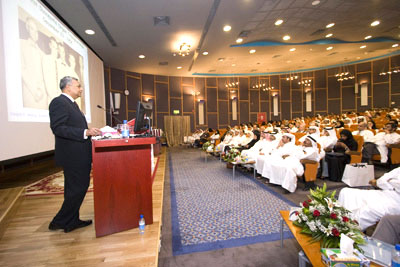World Kidney Day: Emphasizing the role of organ donors
March,2008

There has been huge progress in the care of kidney transplant
patients in the past 50 years, Dr. Suthanthiran told the audience at
HMC on World Kidney Day.
From a Walkathon along Doha's Corniche, to a symposium on chronic kidney disease, to a ceremony recognizing community and individual contributions to kidney patients' treatment: Qatar this year put greater emphasis than ever on marking World Kidney Day, March 13th.
Foremost among the invited speakers was Dr. Manikkam Suthanthiran, Stanton Griffis Distinguished Professor of Medicine, and Chief of Nephrology and Hypertension, and of Transplantation Medicine and Extracorporeal Therapy, at NewYork-Presbyterian/Weill Cornell Medical Center.
Dr. Suthanthiran reviewed progress made in kidney transplantations since the first-ever successful transplant operation in the U.S. in 1954. At the Nephrology Symposium, he discussed new approaches to the post-operative care of patients, with a particular focus on how research in his laboratory and in others is contributing to better management of the challenges posed by rejection and infection.
The prevalence of chronic- and end-stage kidney disease (CKD/ESKD) is estimated at 10-15 percent worldwide, affecting millions of people in developing as well as developed countries. Over 1.4 million are receiving renal replacement therapy.* However, access to treatment is uneven, with hemodialysis costing around $150 per session and necessary up to three times a week.
Driving the increasing number of CKD/ESKD cases are factors such as 'diabesity' (obesity with type 2 diabetes); hypertension; and population ageing. Genetics also plays a part, with black Americans up to five times more susceptible to the disease than whites, Dr. Suthanthiran explained in an interview.
Simple and affordable tools are available to screen for kidney disease, but most effective of all is prevention, said speakers at the symposium, organized by Hamad Medical Corporation (HMC) and attended by health care workers from across Doha, including many based in primary health care centers.
This means paying attention to blood pressure, weight, risk for diabetes and family history, as well as increasing exercise and decreasing - or avoiding - smoking.
"The two things I think we should do better all over the world are that we ought to treat blood pressure better, making it our number one priority; and we ought to treat diabetes better," Dr. Suthanthiran commented.
For patients with CKD/ESKD, transplantation is preferable to dialysis, he went on: "No question, transplantation is superior from many perspectives: quality of life, survival and kidney function."
Nowadays, the procedure results in restoration of up to 70 percent normal kidney function (compared with 10 percent in dialysis patients) and a survival rate of 90 percent over one year.
"The next big challenge is to keep the transplant working long-term, and to prevent infection and post-transplant malignancy," he said. "As people are living longer with the transplant, malignancy is happening in almost 40 percent of the patients in the 20 years following transplantation."
One important step is to minimize the use of immunosuppressive drugs, which prevent organ rejection but have the unwanted effect of making patients more susceptible to complications including infection, malignancy and transplant damage.
Dr. Suthanthiran's research team has already developed a non-invasive gene-based test to detect organ rejection at an early stage. Now undergoing multi-center testing funded by the National Institutes for Health, this should pave the way for more individualized therapy in patients who are identified as susceptible.
The expertise of faculty at Weill Cornell in New York, where kidney transplants have been performed for over 40 years, and totalled 210 in 2007, and at WCMC-Q could make an important contribution to Qatar’s effort to enhance its own program.
Leading transplant surgeon, and professor and Vice-Chairman of Surgery at WCMC-Q, Dr. Bakr Nour, said this was a key area of his work: "With improved results and more awareness of organ donation; with more resources from HMC and with the help of the New York campus, we can take the program to international levels."
The audience at the Symposium heard that Qatar's first kidney transplant was carried out in 1999. Increased efforts are now being made to encourage potential donors to step forward, with a Strategic Plan for Organ Donation in the pipeline. Meanwhile, Chairperson of HMC, Dr. Latifa Al-Houty, brought her influence to bear by emphasizing the importance of signing up as a donor during her speech on the occasion of World Kidney Day.
Report by Sylvia M. Ismail
*Renal replacement therapy encompasses both dialysis and transplantation; figure from the WHO report: "How can we achieve global equity in provision of renal replacement therapy?"
